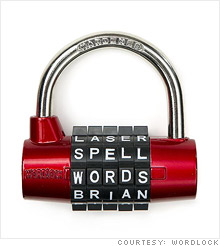Protecting your creation from pirates
A startup struggles to defend its innovative padlock technology.

(Fortune Small Business) -- Some new technologies are almost absurdly simple - and just as easy to pirate.
That's what Todd Basche discovered when he asked himself why padlocks use digits rather than letters. Surely a code word would be easier to remember than a number. Basche, a former vice president at Apple (AAPL, Fortune 500), found century-old patents for alphabet-based locks. But most described a device with 26 characters on each wheel, which was too unwieldy to manufacture.
Basche patented a lock with 10 characters per wheel and a computer algorithm that told him which letters should go where to create the maximum number of words - estimated to be in the thousands. He tried licensing the idea to top U.S. lock manufacturers, but they weren't interested.
"They owned the market and saw no need to innovate," Basche says.
Two years ago Basche and his wife, Rahn, decided to muscle their way into the $300 million U.S. padlock market. They founded a Santa Clara, Calif. company, Wordlock, to design and make padlocks for school lockers and bicycles. By mid-2008, Wordlock had seen its distribution network grow from zero to 10,000 stores across the U.S., including Kmart, Sears (SHLD, Fortune 500), Target (TGT, Fortune 500) and Walgreens (WAG, Fortune 500).
The Basches are cagey about sales figures, but retailers say Wordlock's business is brisk. Walgreens, which accounts for more than half of the stores, says it is selling more than 2,000 locks a month at $10 apiece.
"Wordlock is something new and exciting in a category that really doesn't have a lot of innovation," says Mark Delaney, an analyst with market research firm NPD.
The price of that innovation: eternal vigilance. Basche estimates he has spent $200,000 creating and defending patents and trademarks. Recently he sent cease-and-desist letters to two companies that began marketing a similar product. (The letters did the trick.) The Basches plan to launch eight more letter-based lock products in 2009 - and hope that imitators will have a hard time keeping up. ![]()
-
The Cheesecake Factory created smaller portions to survive the downturn. Play
-
A breeder of award-winning marijuana seeds is following the money and heading to the U.S. More
-
Most small businesses die within five years, but Amish businesses have a survival rate north of 90%. More
-
The 10 most popular franchise brands over the past decade -- and their failure rates. More
-
These firms are the last left in America making iconic products now in their twilight. More








